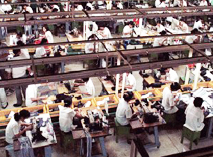
How the Private Sector Didn’t Solve Ghana’s Water Crisis
Government investment, rather than privatization or international aid, offers the best solution for water services in Ghana.

Government investment, rather than privatization or international aid, offers the best solution for water services in Ghana.

Source: Counterpunch
Zimbabwe’s political-economic crisis continues because dislodging decades of malgovernance has not been achieved by either a Government of National Unity that began in early 2009, civil society activism, or international pressure, including this week’s Maputo summit of the main body charged with sorting out democratisation, the Southern African Development Community (SADC). With a new draft Constitution nearly ready for a referendum vote, followed by a presidential and parliamentary election by next April, the period immediately ahead is critical.

Source: Truthdig
I was on the 15th floor of the Southern U.S. District Court in New York in the courtroom of Judge Katherine Forrest last Tuesday. It was the final hearing in the lawsuit I brought in January against President Barack Obama and Secretary of Defense Leon Panetta. I filed the suit, along with lawyers Carl J. Mayer and Bruce I. Afran, over Section 1021 of the National Defense Authorization Act (NDAA). We were late joined by six co-plaintiffs including Noam Chomsky and Daniel Ellsberg.

Source: Institute for Policy Studies
The news from Syria is really bad these days. And bad stuff in Syria doesn’t stay in Syria – though Syrian civilians are paying by far the biggest price. With outside governments calling the shots in a civil war, arming both sides, and motivated less by concern for civilians than by their own narrow national interests, we’ve got serious trouble.
And right now unfortunately, that outside super-power game remains dominant. Syria has become the crucible for a number of separate wars, battles for power and influence, for regional resources and access, for strategic location and military expansion. These wars pit regional contenders of the Arab Gulf states and Turkey against Syria and Iran. They set the terms of the rising sectarian battle between Sunni-dominated Saudi Arabia and Qatar vs. Shi’a power in Syria, Iraq and Iran. They shape the Middle East competition between the U.S. and Russia for global military/strategic power. And crucially, of course, Syria is a central component of the U.S., Israeli and western campaign against Iran.

Source: The Nation
ZABADANI, SYRIA — Mustafa al-Dahab, 58, drives past shuttered shops on a deserted street in Hara, a neighborhood in this picturesque resort town located 20 miles northwest of Damascus. His nephew, five year-old Adee Adalati, is next to him in the passenger seat. It’s just after 11:00 on a Wednesday morning.
More than two miles away, hidden from view, a soldier overlooking the town from a tank on an eastern mountaintop opens fire, launching a shell into the sky that arcs towards them.

With the US presidential election in sight, the outsourcing of American jobs overseas has become one of the hottest campaign issues. Both leading candidates are calling on corporate America to bring jobs back to US shores even though the outlook for more jobs to go overseas is as bleak as ever.
Copyright Toward Freedom 2019